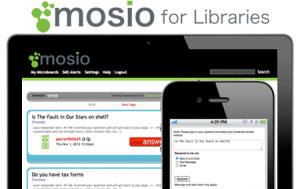Mosio Partners with Tshwane University of Technology for its First Library Solution in South Africa
Aug. 14, 2013 – PRETORIA, South Africa — Mosio for Libraries, an all-in-one, multi-channel virtual reference software for libraries, announces its first solution implementation in South Africa. The company’s partnership with Tshwane University of Technology will enable library staff to interact with patrons and answer questions via live chat, email, text messaging and Facebook.
“We are extremely excited to add Tshwane University of Technology’s Libraries to our client roster and have already established a great, collaborative relationship with their team,” said Noel Chandler, CEO and Co-Founder of Mosio. “As one of Africa’s leading universities of technology, we look forward to continuing our work to help them provide excellent information resources to students online or on-the-go.”
The Mosio for Libraries solution will launch in August, 2013, and will be rolled out to nine campuses, supporting approximately 56,000 students. The software features a secure, easy to use, web-based dashboard that can be utilized for two-way interactions with library patrons. Popular communication and efficiency tools include answer templates, customizable auto-responders and collaboration features. “The LIS is introducing major and exciting student service enhancements, including Mosio”, said Vivian Agyei, the Director for Library and Information Services.
“We are thrilled to become Mosio for Libraries’ first partner in South Africa,” said Nokuphiwa Kunene, Systems Librarian at Tshwane University of Technology. “Our priority is to implement a strong technology solution that allows us to better serve and interact with students, while also enabling us to maximize the use of resources by efficiently managing communications.
Mosio for Libraries is available in 21 countries, including the U.S., Canada, UK, Spain, Australia and South Africa. The software is cloud-based, so it is always up to date and does not require any hardware or software installation. The dashboard can be accessed on any web-enabled computer or device, regardless of physical location.
Mosio for Libraries integrates easily across websites, blogs and online databases through support tabs and widgets, and plugins and apps are available for Drupal, Joomla!, WordPress and Facebook.
About Mosio for Libraries
Mosio for Libraries is an all-in-one, multi-channel support software that enables libraries to receive and respond to patron questions via live chat, email, text messaging and Facebook. Visit http://mosio.com/libraries to learn more, sign up for a free trial and be greeted at the front door with a 90-second video detailing Mosio’s technology solution to a problem faced by libraries all over the world.
About TUT
In its logo, the Tshwane University of Technology claims that “we empower people” thus committing itself to the concepts of Diversity, Ethics, Relevance, Entrepreneurship, Care, Partnerships, Professionalism and lastly, Quality. TUT awards qualifications from national diploma level through to bachelor of technology degrees. Students may also continue with postgraduate studies towards master’s degrees and doctorates.
Why choose a University of Technology?
One of the strong features of obtaining a qualification at a university of technology, is the specialization in a chosen field. Furthermore entrepreneurship carries a lot of weight in the students’ education, since they are taught new ways of thinking and approaching their careers to become job creators rather than job seekers in the market,
It is a fact that South Africa is still in dire need of people suitably qualified in science, engineering and technology, the so-called SET courses. TUT offers numerous courses in these fields. But apart from academic qualifications, the university also offers programmes to equip students with specific skills to prepare them for the world of work. Some of these programmes especially those aimed at improving communication, writing, reading and interpersonal skills, form part of their academic programme.
TUT is divided into seven faculties:
– Faculty of Economics and Finance
– Faculty of Engineering and the Built Environment
– Faculty of Humanities
– Faculty of Information and Communication Technology
– Faculty of Management Sciences
– Faculty of Science
– Faculty of the Arts
At TUT the emphasis is on:
– Cutting edge technology
– Innovation through to commercialization
– Problem-solving skills
– Research and Innovation
– Partnerships and networks
– Technological incubators, technology stations, centres and institutes
– Community engagement
For more information visit http://www.tut.ac.za
